Marcus Whitlock of Raven
Marcus Whitlock of Raven interviewed
Marcus Whitlock is one of several Brits working with Raven Softare in Wisconsin, a self confessed "northern b***ard" who was born in Birmingham but lived most of his life in Hull, on the Yorkshire coast.
We tracked him down to talk to him about how he got started in the gaming industry, and of course his current work on Soldier of Fortune.
Getting Started
Like many game developers, Marcus was first exposed to computers at an early age, but it was his brother who was the programmer...
"As a schoolkid, my younger brother and I had access to several home computers (TRS-80, BBC Micro, Spectrum, Atari800XL). Back then I never had that much interest in learning to program, whilst, my brother really got into coding his own games in BASIC and assembler."
"I did dabble a bit with BASIC and some assembler, but I guess I was really more content to just play commercially developed games. I think Alternate Reality on the Atari800XL is my fondest memory of those early games."
"Anyhow, it wasn't until I was figuring out what I was supposed to do with my life that I decided 'what the hell, maybe this could be interesting work' and enrolled at university for a software engineering diploma, and then after that a degree in computer science."
"During my student days I spent many long nights playing classics like X-Wing, Ultima Underworld 2, and DOOM (of course), and I taught myself about DOS, C programming, and Intel x86 assembly language."
"Despite these distractions, I worked hard at my studies and got good qualifications."
Millenium
"By the time I graduated, I knew full well that the world of data processing and spreadsheets just wasn't my bag", Marcus told us. "I spent 5 months trying to land my first job as a game programmer, before Millennium Interactive (now Sony Cambridge I believe) gave me the benefit of the doubt and hired me."
On arriving at Millenium, despite having no real experience in the gaming industry, Marcus was very much thrown in at the deep end...
"My first job was to port Defcon 5 (which was still being written at the time) from the PlayStation to the PC - DX2 66MHz, and no snazzy 3D accelerator cards with Direct3D or OpenGL back then fella! Remember, this is 1994 we're talking about..."
"Boy - I really floundered for a while!!", Marcus admitted. "Talk about panic - I was the only PC programmer, and it was my first job!"
"But eventually, things began to shape up as more folk came on board, and I was also fortunate that a veteran PC programmer called Mark Stamps had just joined the company to assume the role of lead programmer."
Although this rather sudden introduction to game programming was something of a shock at the time, the experience proved to be valuable.
"There's no doubt that being thrown in at the deep end helped me develop confidence in myself and become a better programmer", according to Marcus.

Run Away!
After a couple of years at Millenium it was time to move on though...
"How I got here to the good old US of A is kind of a long story - but basically I needed to get myself out of the country, to try something new, else I think I'd have topped myself. :)"
"Sometimes you get stuck in a rut and need a big change", Marcus explains. And in his case that "big change" was a move across the Atlantic to America, and finding a new job at Raven Software...
"I'd never even heard of the city of Madison, or the state of Wisconsin. When the agency guy suggested that Raven were interested in talking to me, I was thinking 'I wanna go to California - not some crazy backwoods farming community'."
Despite having some doubts about their location, Marcus was familiar with Raven's previous work and decided to give them a try. "I knew they had done some very nice fantasy games in the past, and I just love fantasy and role-playing games - not those horrible cutesy Japanese style things, mind you!"
"So I went out there for the interview and came back with a job offer, thinking 'Wow - what a really nice, talented bunch of people'. The rest is history."
Marcus doesn't regret leaving the UK. "I really do miss my friends back in England... my parents and brother too. But everything else I can do without."
"I'm not going to get on my soapbox and bash the UK - it's not the worst place to live, and it is my birthplace after all, but the fact is that the opportunities in the US for someone like myself are quite nice."
America isn't without its problems as well though. "The biggest negative is all the legal and immigrations related nonsense I'm still dealing with. Oh well - can't expect to have it all my way can I?"
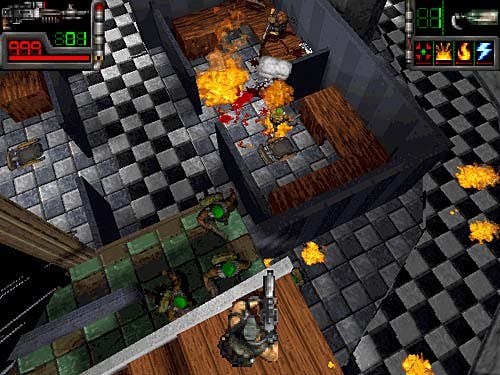
Better Late Than Never
"Originally Raven hired me as I had Microsoft DirectX experience", Marcus told us. "They needed someone to help out with getting Direct3D integrated into the Take No Prisoners engine."
One of Raven's less well known games, Take No Prisoners was a 3D top-down shooter, and the last game that the company designed using their own engine. Since then all their releases have been based on licensed technology from id Software.
Unfortunately, problems with America's ridiculous immigration system delayed his arrival at Raven, and by the time it finally arrived in Wisconsin it was too late for Marcus to do what he had been hired for!
"My work visa took so darn long to turn up (4 months!!!), that when I finally did arrive on American turf... all the work was done. So I ended up writing AI scripts instead. Not all that exciting I'm afraid, but it was good to be back at work and earning a living after being unemployed for 4 months."
Once Take No Prisoners was completed Marcus moved on to Raven's third person action game, Heretic II, mostly working on the camera system and network programming.
His latest project though is the "realistic" first person shooter, Soldier of Fortune, based on a highly modified version of the Quake 2 engine. I'm sure that's what you've all come here to read about, so without any further ado...
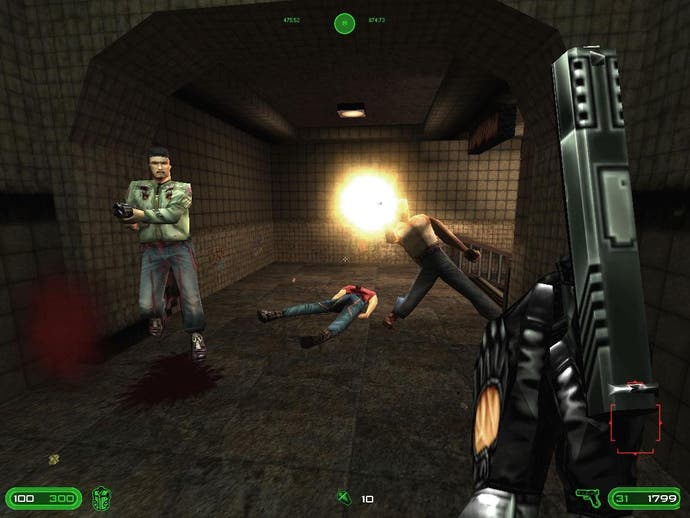
A View-Weapon To A Kill
Marcus has mostly been working on the game's five multiplayer modes, "as well as enhancements to networking and client-prediction".
"In terms of networking, Gil Gribb (tech. director at Raven) has been responsible for streamlining the original Quake 2 networking for SoF, whilst I've been working on the prediction side of things."
"In particular, the in-view weapons you're carrying are now predicted", Marcus told us. "In Quake 2 (of which there isn't much left now) they looked awful under lag and packet loss."
"Basically the principle is to allow the view weapons to animate mostly independently of the server, subject to a few parameters that are determined from what the server sends down (like how much ammo the server says you have)."
"This is the second time I've worked on this kind of stuff - I also did the predicted stuff on Heretic 2 - and it's still something that's hard (well, for me anyway) to get right. You never can be 100% correct with prediction."
"Networking (to deal with latency and packet loss) is the toughest aspect of game development that I've had to deal with. Of course, I've not done any serious physics related stuff. :)"
"The one thing about this lark (game development) is that you're learning new stuff *all* the time - you *never* get bored for lack of a challenge."
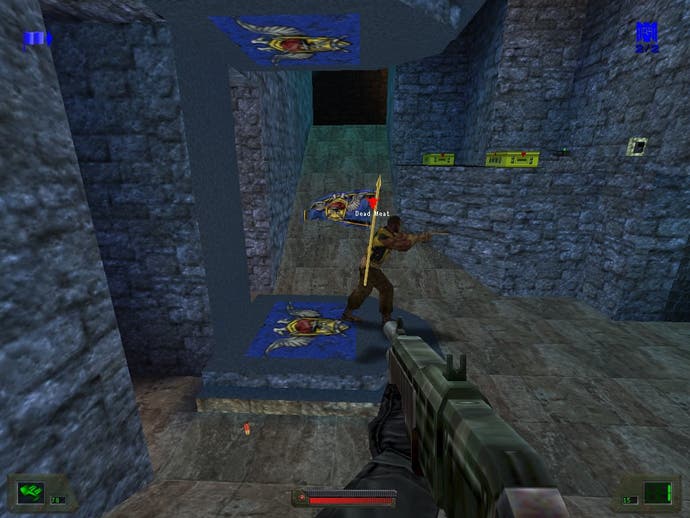
No Frills
He's had a hand in a lot of things though, as he explains... "When crunch time strikes, the way things work on such a big project is that everyone pitches in and works on stuff as needed. Gets a little chaotic mind you!"
"We have kind of an 'as-needed' approach to allocation of programmers. So originally, Nathan Mackenzie was slated to write the different DM games. He started out creating a basic framework for this. But then he was needed to work on AI stuff, so I got to carry on the job of writing the DM stuff."
"Alongside the basic deathmatch game, assassin and arsenal are two games we 'lifted' from 'Take No Prisoners', and I've been implementing those. We also have a CTF game that Jake Simpson has been working on, along with a 'realistic' game that does the 'Action Quake 2' thing (courtesy of Dan "I want Action Quake 2's babies" Kramer and Keith Fuller)."
At the end of the day though, Marcus is a deathmatch man. "To be honest I think I prefer the straight deathmatch game - pure and simple fragging - no frills, just keep focused on the task of gibbing your way to the top. :)"
"CTF is a nice change every once in a while though. Assuming that is, that you don't have anyone playing who deliberately goes out of the way to spoil the game for everyone else who wants to play a team game. Grrrr."
There's always one...
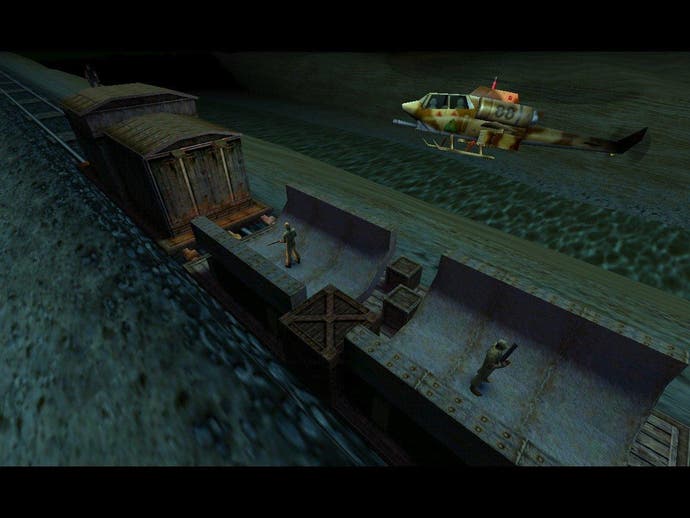
The Sales Pitch
Apart from the wide range of multiplayer options, what is going to make Soldier of Fortune stand out from the crowd when it's released?
"I think just the way the game feels compared to other FPSs", Marcus told us. "SoF is more grittily realistic than has been done before. You'll have to play it when it hits the shelves to see what I mean."
Gritty and realistic in a first person shooter inevitably means gory though, and Marcus was quick to point out that the excessive blood and realistic injuries can be toned by anxious parents or those with a weak stomach.
"We've gone out of our way to ensure that the game can be installed with all the gore etc. disabled and password locked so that parents can shield their kids from anything inappropriate."
And although he has mostly been working on the multiplayer side of things, Marcus singled out the single player part of the game for praise.
"I think people will appreciate the strong single player game which has a good, compelling storyline (helped along by some neat in-engine cutscenes) that will make you want to finish the game."
"Technically speaking, SoF's engine is more than capable of going up against Unreal Tournament and Quake 3 Arena. Rick Johnson (lead programmer on SoF), recently drew up a feature by feature comparison of SoF, UT and Q3A .. SoF by far and away supports the most cool 'buzzword' features."
"The only thing we really miss out on is curved surfaces like Q3A has. Because we started from the Q2 engine, some folk naturally assume SoF is just some glorified mod. Are they in for a shock when they get to play the finished product!"
"Oh and yes, the game is a *lot* of fun, which sometimes helps sell games I suppose. :)"
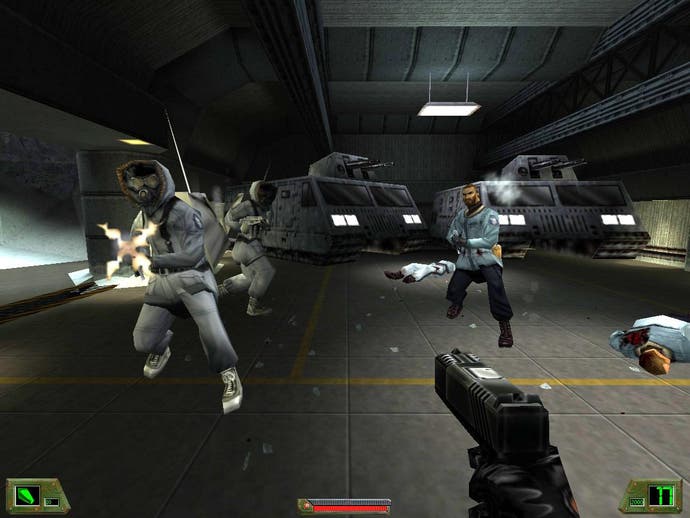
Frozen
Fun is something that's very important at Raven...
"Sure it gets a bit hectic at crunch time, but people here still take a little time to have some fun, and Steve and Brian Raffel (boss men / co-founders) are very fair and do a great job in keeping nearly everyone happy, nearly all the time (laugh)!"
"Last year we had a Raven skiing weekend up north, barbecued out (when the weather was warmer - recently it's been a marrow chilling -30 degrees outside, with wind-chill and all that), and made day-trips to the Great America amusement park in Illinois."
"Personally though, I don't like to spend so much time of my leisure hanging out here since I met my current girlfriend, last April."
Marcus doesn't have much time for leisure at the moment anyway though, as Soldier of Fortune is in crunch mode...
"Because of the sheer size and complexity of SoF, testing and tweaking is taking a while", he told us. "But things are looking good for a timely release."
We better let him get back to it then...
-







